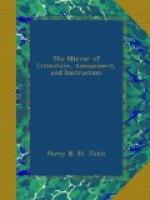“I was one day feeding the poor elephant (who was so barbarously put to death at Exeter ’Change) with potatoes, which he took out of my hand. One of them, a round one, fell on the floor, just out of the reach of his proboscis. He leaned against his wooden bar, put out his trunk, and could just touch the potato, but could not pick it up. After several ineffectual efforts, he at last blew the potato against the opposite wall with sufficient force to make it rebound, and he then, without difficulty, secured it. Now it is quite clear, I think, that instinct never taught the elephant to procure his food in this manner; and it must, therefore, have been reason, or some intellectual faculty, which enabled him to be so good a judge of cause and effect. Indeed, the reflecting power of some animals is quite extraordinary. I had a dog who was much attached to me, and who, in consequence of his having been tied up on a Sunday morning, to prevent his accompanying me to church, would conceal himself in good time on that day, and I was sure to find him either at the entrance of the church, or if he could get in, under the place where I usually sat.
“I have been often much delighted with watching the manner in which some of the old bucks in Bushy Park contrive to get the berries from the fine thorn-trees there. They will raise themselves on their hind legs, give a spring, entangle their horns in the lower branches of the tree, give them one or two shakes, which make some of the berries full, and they will then quietly pick them up.
“A strong proof of intellect was given in the case of Colonel O’Kelly’s parrot. When the colonel and his parrot were at Brighton, the bird was asked to sing; he answered ‘I can’t,’ Another time he left off in the middle of a tune, and said, ‘I have forgot.’ Colonel O’Kelly continued the tune for a few notes; the parrot took it up where the Colonel had left off. The parrot took up the bottom of a lady’s petticoat, and said ‘What a pretty foot!’ The parrot seeing the family at breakfast said, ‘Won’t you give some breakfast to Poll?’ The company teazed and mopped him a good deal; he said ’I don’t like it.’—(From a Memorandum found amongst the late Earl of Guildford’s Papers.)”
Eels.
Several pages are devoted to the economy of these curious creatures, and as many points of their history are warmly contested, Mr. Jesse’s experience is valuable.
“That they do wander[6] from one place to another is evident, as I am assured that they have been found in ponds in Richmond Park, which had been previously cleaned out and mudded, and into which no water could run except from the springs which supplied it.[7] An annual migration of young eels takes place in the River Thames in the month of May, and they have generally made their appearance at Kingston, in their way upwards, about the second week in that month, and accident has so determined it, that, for several years together




